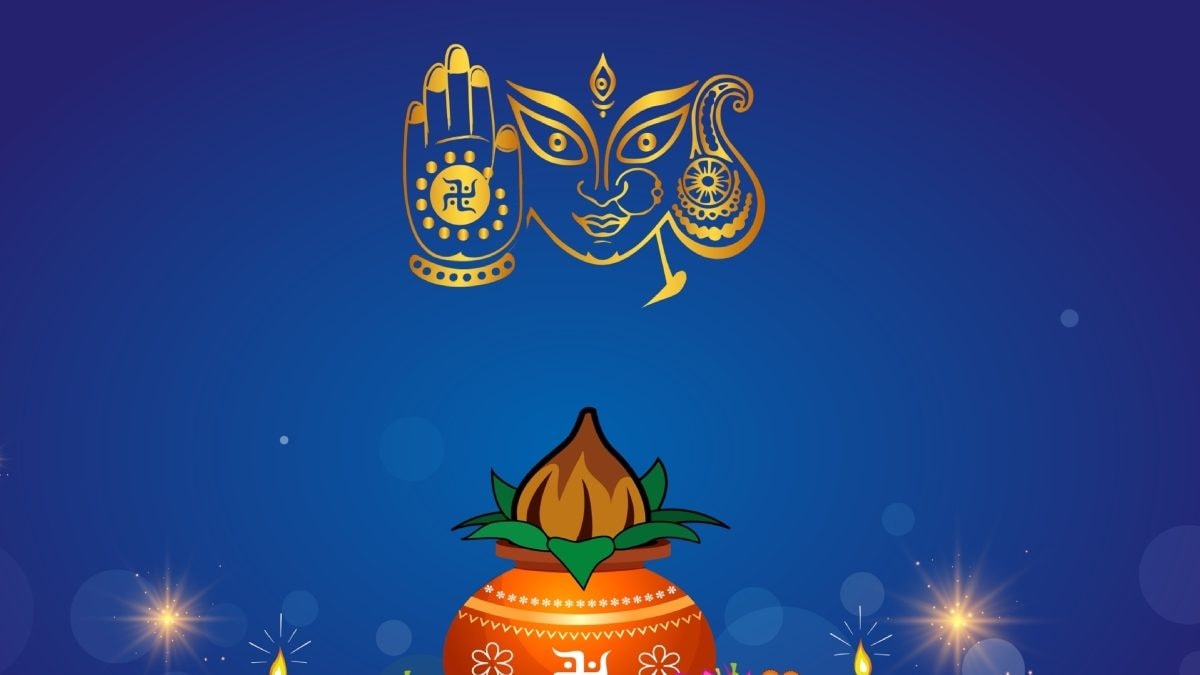Navratri 2023: Ghatasthapana Muhurat, Puja Samagri, Rituals and Significance

Published By: Nibandh Vinod
Last Updated: October 15, 2023, 00:25 IST
Shardiya Navratri 2023: This year, Ashwina Ghatasthapana will fall on Sunday, October 15. (Image: Shutterstock)
Navratri 2023: Here’s a look at Ghatasthapana date, shubh muhurat, puja rituals, puja samagri, and significance of Shardiya Navratri.
SHARDIYA NAVRATRI 2023: Navratri is one of the grandest celebrations in the Hindu calendar. This nine-day festival celebrates the victory of Goddess Durga over the demon Mahishasura. On this day, Hindu devotees come together to worship the nine forms of Maa Durga, also known as Navdurgas, with great pomp and fervour. The festival begins on October 15 and ends on October 23. It begins with Ghatasthapana on the first day and concludes with Maha Navami.
ALSO READ: Happy Navratri 2023: Shardiya Navratri Wishes, Messages, Images and Quotes to Share
Meanwhile, Navratri Parana which involves breaking the fast is observed on the tenth day. Also known as the Dashami Tithi, it is celebrated as Vijayadashmi or Dussehra to commemorate Lord Rama’s victory over Ravana and Goddess Durga’s win over Mahishasura. On this day, devotees also carry out Durga Visarjan, signifying the conclusion of the Durga Puja festival.
Ghatasthapana: Date & Time
According to Drik Panchang, this year, Ashwina Ghatasthapana will fall on Sunday, October 15. The Ghatasthapana Muhurat is from 06:21 AM to 10:12 AM, with a duration of 3 hours and 50 minutes. Additionally, there is a Ghatasthapana Abhijit Muhurat from 11:44 AM to 12:30 PM, lasting 46 minutes. On this day, devotees worship Maa Shailputri.
Ghatasthapana: Ritual & Significance
Shardiya Ghatasthapana is also known as Kalash Sthapana or Kalashsthapana. It is an important Navratri ritual that signifies the beginning of nine days of festivities. The guidelines within our scriptures emphasize the significance of performing Ghatasthapana during a specific period at the onset of Navratri. Deviating from this sacred timeframe may invoke the wrath of Goddess Shakti. It is important to note that Ghatasthapana is strictly prohibited during Amavasya and the nighttime.
ALSO READ: Navratri 2023: Date, Colours, Muhurat, and Significance of Shardiya Navratri
The most auspicious moment for Ghatasthapana is during the first one-third of the day, while Pratipada prevails. In case this specific time slot is unavailable for any reason, Ghatasthapana can be scheduled during the Abhijit Muhurta. While Nakshatra Chitra and Vaidhriti Yoga are best avoided, they are not entirely forbidden. The most essential thing is to ensure that Ghatasthapana is completed before Hindu midday while Pratipada remains in effect.
Ghatasthapana: Puja Samagri
Here are a few items that are required for puja samagri:
- Clay or Brass Pot to sow Sapta Dhanya
- Clean Soil to sow Sapta Dhanya
- Sapta Dhanya or seeds of seven different grains
- Small clay or brass Pitcher
- Ganga Jal
- Sacred thread
- Scent (perfume)
- Supari (betel nuts)
- Coins to put into the Kalash
- 5 leaves of Ashoka or Mango tree
- A Lid to cover the Kalash
- Raw Rice to put on the lid
- Unpeeled Coconut
- Red Cloth to warp coconut
- Flowers and Garland preferably marigold
- Durva grass

Atul Tiwari is a seasoned journalist at Mumbai Times, specializing in city news, culture, and human-interest stories. With a knack for uncovering compelling narratives, Atul brings Mumbai’s vibrant spirit to life through his writing.





